Get a Taste of Daily Life in Cuba’s Bed and Breakfasts
Stay in Casas Particulares to Experience Rich Cuban Culture
Article and photos by Lies Ouwerkerk
Senior Contributing Editor
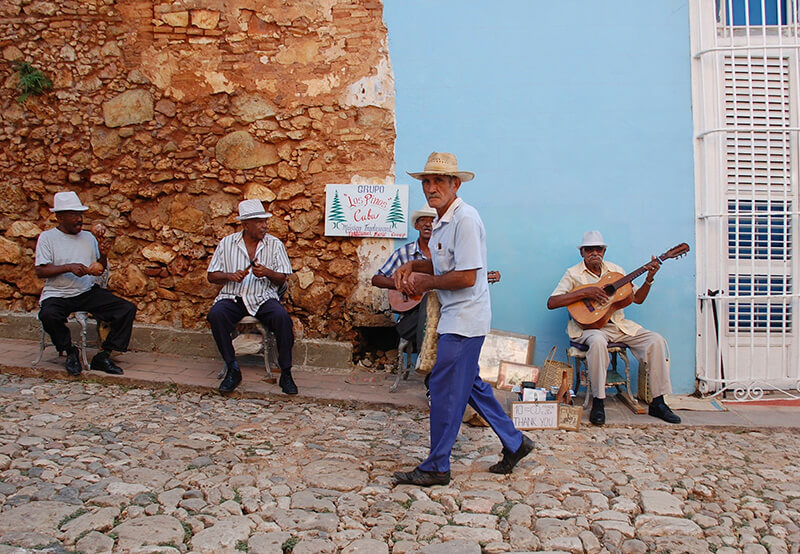 |
| Street music in Trinidad, Cuba. |
Most visitors to Cuba, wishing to escape the dark and long winters in their own countries, book into all-inclusive beach resorts promising sun, sea, and cheap mojitos, far away from where real Cuban life unfolds. At best, they may sign up for an escorted daytrip to Cuba’s capital Havana, to stroll through the touristy and spruced up part of the historic center, and ride along the 8km (5-mile) long Malecón esplanade in a classic American car from the 50’s.
There are, however, a growing number of travelers discovering there is much more to Cuba than beautiful beaches alone: picturesque colonial towns like Trinidad, Camaguay, and Santiago de Cuba. The adventurous traveler can enjoy hiking, rock climbing, bird watching in National Parks and the Viñales Valley, white-water rafting, scuba diving or snorkeling, and not to forget, the intoxicating rhythms of Cuban music one can find on street corners, in dance clubs, or at other music venues. However, the biggest draw of all is undoubtedly the Cubans themselves, who are trying to play the limited cards they are dealt with an admirable resourcefulness, perseverance, and zest for life.
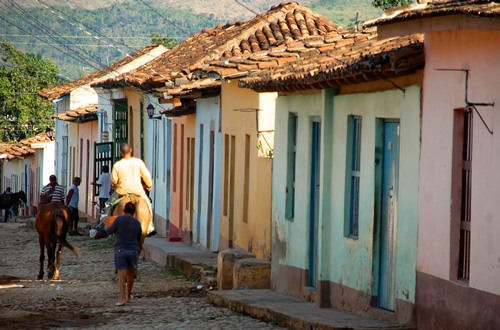 |
| Cobblestone streets of Trinidad. |
Traveling along Cuba’s casas particulares is an ideal, affordable way to meet ordinary Cubans and get more insight into their daily lives. Privately owned single family residences, but strictly licensed and regulated by the government, the casas are the Cuban version of our bed and breakfasts and one of the few ways Cubans can make a couple of extra bucks to supplement their minimal incomes. Although simple, the rooms are clean and air-conditioned, have an annex private bathroom with shower, and include a copious breakfast served in the courtyard. Often there is a fridge in the room as well. Best of all, you get this great sense of being part of their family, since the slogan "mi casa es su casa" invariably reigns. Once tapped into their network, you’ll be free of accommodation and transport problems for the rest of your travel in Cuba: casa owners, happy to help you out, will simply refer you to family members, friends, or contacts of contacts all over the island.
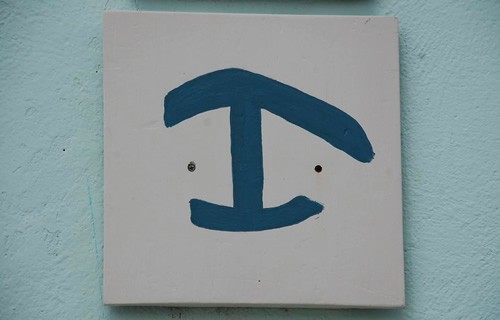 |
| Logo for the casas particulares. |
After traveling nine hours on the overnight bus from Santiago de Cuba, I am welcomed at Trinidad’s station by a bici-cab driver carrying a signal with my name, who pedals me swiftly to Miriam’s casa. I am greeted like a long-lost family member, and a lavish breakfast is already awaiting me in thatched roof covered patio. Gregarious Miriam joins me to offer some tips about her native town, where pedi-cabs, horse-drawn carts, old Ladas and American cars of the 50’s still dominate the scene in the picturesque cobble-stoned streets, lined with pastel-colored colonial houses and centuries-old churches.
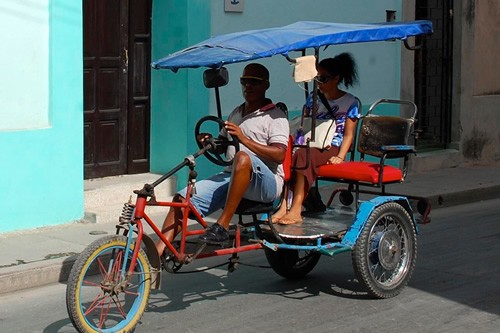 |
| Bici-cab in Trinidad, Cuba. |
After returning to the casa from a stroll around town later that day, I struggle with the casa’s door lock. However, not for long, as a neighbor immediately comes to my rescue, hollering through an open window, to get Miriam’s attention.
“How about dancing in town tonight?’ Miriam asks me later on her roof terrace overlooking Trinidad, and although it sounds like a great idea, I am plagued by a terrible throat ache and have lost my voice. Instead of heading for the dance floor, Miriam emerges without any sign of disappointment as a dedicated nurse, bringing me a big pot of boiling water and a towel to drape over my head to sniff the vapor, tea with honey, and a magic pill to recuperate overnight. And when I mention my plans to travel the next day to Viñales, a 7-hour drive further northwest, Miriam immediately picks up the phone to confirm my reservation and to consult her network to find me a shared cab for early next morning.
That my co-passengers are a charming young couple from my native country is already a bonus, but chatting with the taxi driver about life in Cuba, makes the ride priceless. He rents his taxi from a doctor with family connections overseas, who provided the funds to purchase this second-hand vehicle. Nevertheless, in order to keep and maintain it, the doctor has to rent out the car to my taxi driver and so earn some extra income from it. Pointing at huge cattle trucks transporting people standing in upright position, and at clusters of people hitchhiking along the highway, he says, “Look, that is how doctors and lawyers go to work when they have to go far. They don’t earn enough money to pay a car, taxi, or bus.”
We also talk about the many underground networks that exist to achieve something against all odds, the black market where Cubans purchase items otherwise too expensive to even think about, the limited access to Internet (although one always knows a friend of a friend of a friend who does have a computer), and the difficulties of obtaining a visa to travel abroad — something most Cubans can only dream about. “Yes, education and health are indeed free and accessible to every Cuban, but if you really want adequate medical attention, you better bring along a bottle of rum or a premium cut of meat,” he says. And why do I think someone like him, a university graduate, is driving a taxi? Because Cuba is cut off from the world, and better jobs are hard to come by.
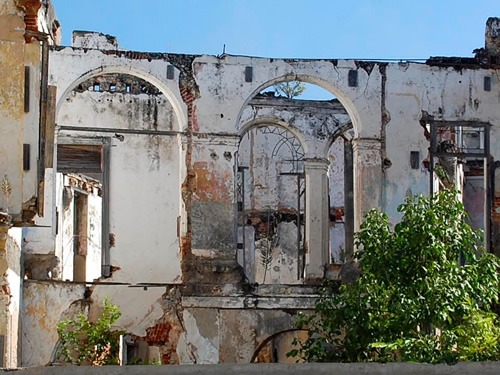 |
| Havana's colonial architectural treasures are deteriorating at an alarming rate because of age, humidity, and neglect. |
My lovely hosts in Viñales, both doctors, cook delicious, fresh lobster and river shrimps from an undisclosed provider, for a few other guests and myself. They also join us at the dinner table to find out how we would like to spend our time in the region. Next day, I find myself hooked up with a tobacco farmer who shows me around his family property, explaining the process from seeds to cigar, and initiating me into the forbidden sport of cock fighting with roosters he trains to become full-fledged competitors.
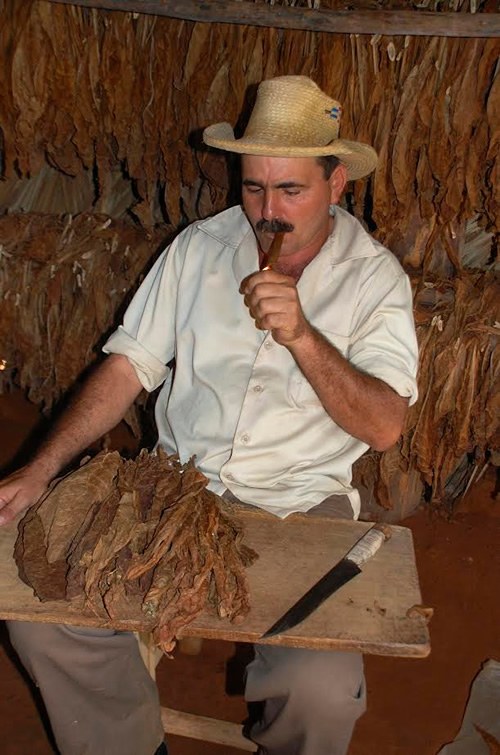 |
| A tobacco farmer. |
In the afternoon, I hike with a guide through the "Valle de Palmarí," a fascinating region of green tobacco fields and mogote mountains (oddly shaped limestone formations that attract a growing amount of rock climbers these days), encountering tobacco farmers and horsemen along the way, always eager to have a friendly chat.
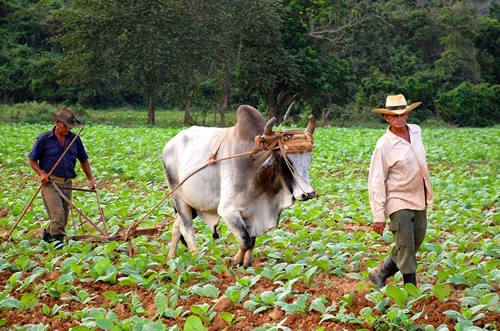 |
| Ploughing the land in the Palmari region. |
Then it is off to Havana in another shared taxi, to my next casa particular in Vedado, a leafy neighborhood with lots of colonial houses, several kilometers away from the city center, but much safer to walk around.
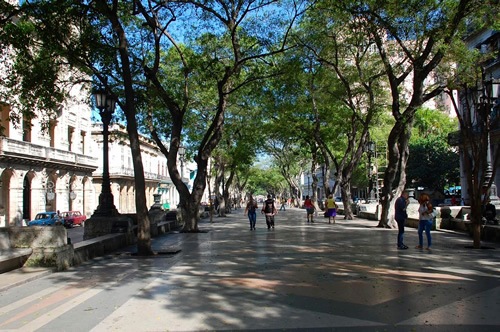 |
| Paseo del Prado, Havana's first paved street, lined with trees and marble benches. |
It is Christmas Eve, and Anna invites me to her "Nochebuena," celebrated with an elaborate meal and salsa dancing, a perfect way to become rapidly "part of the family."
In the days to follow, they guide me through the city, refer me to reliable taxi drivers, cook excellent meals, prepare mojitos, show me family pictures and talk about their lives, fears, and hopes for the future.
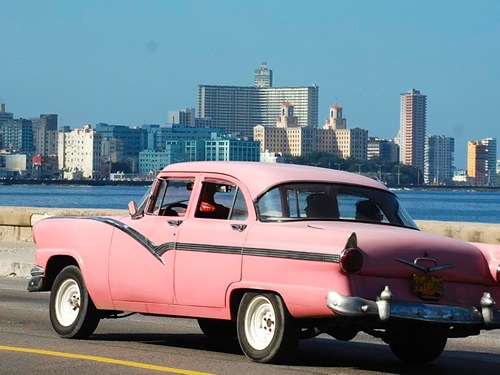 |
| Driving along Havana's famous Malecón esplanade. |
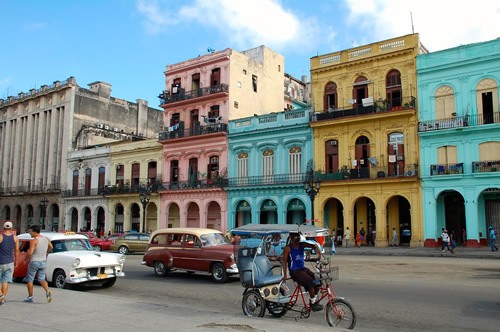 |
| Old Havana's pastel-colored colonial buildings. |
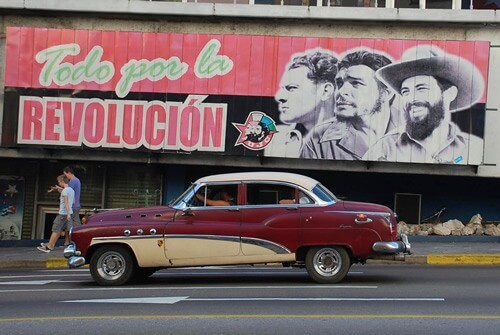 |
| An early 50's car passing a bill board featuring revolutionary heroes from the past. |
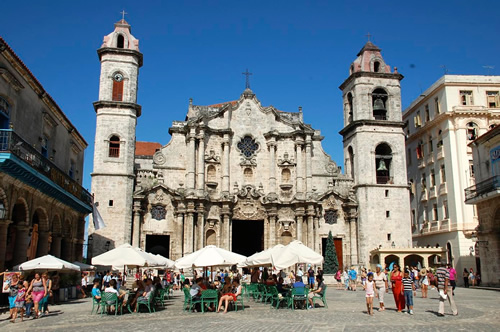 |
| Restored cathedral in old Havana. |
Still another celebration awaits me in a casa in Varadero, one of Cuba’s main beach resort locations, from where I’ll catch a cheap flight home. Not only do they celebrate their son’s birthday, but my host Roberto and his wife have also become grandparents on Christmas Day. Friends and family flock together at the house for paella and drinks, treating me like a guest of honor. I am hardly surprised anymore when I am invited to meet mother and newborn baby in their bedroom, nor when a taxi driver drops me off at the airport and bids me a tender farewell, before I am disappearing into the departure hall.
For More Info
- Reconfirm casa bookings at least two days before arrival (your current casa owner will call for you; U.S. cell phones do not work in Cuba), otherwise there is a chance your room may be rented out to someone else. Although this might look as if casa owners are unreliable, the reverse — travelers not showing up after having booked — is actually occurring more frequently. Not being able to demand a down payment from their prospective guests in advance and often relying desperately on their little extra income, Cubans find themselves in a vulnerable position.
- Upon arriving at a bus station, stick to the directions and name of the casa you have arranged. Jineteros (hustlers) or taxi drivers may try to bring you to some other, often unlicensed casa instead.
- Cuban currency can be a bit confusing, as there are two systems: Cuban Pesos for locals, and Cuban Convertible Pesos (CUC) for foreigners. 1 US$ = about 1 CUC.
- Changing money into CUCs can be done upon arrival in the airport, in hotels, at any bank or Casa de Cambio. To avoid long lines, the airport is by far the best option. The best exchange rates are for Euros and Pounds. Bringing traveler checks and American dollars is not recommended.
- Visa and Master cards, if not issued by an American bank, might work occasionally, but the mode of payment in Cuba is CASH in most places, and certainly in casas particulares, paladares (privately owned small restaurants), and taxis.
- Cubans are incredibly friendly, and you will feel quickly at ease with most of them. Caution with “friendships” that blossom in the street is advised, however, as some jineteros may take advantage of you by suggesting that you go to a café or restaurant that is far out of their own financial reach, and suddenly disappear when the bill arrives.
- Although the general American traveler does not have easy access to Cuba due to travel restrictions imposed by the U.S. government, some Americans are visiting Cuba regardless, by either taking the legal route (type into your favorite search engine: "legal travel to Cuba"), and through arrangements made by foreign-based tour operators, or through the backdoor via Canada, Mexico, or the Bahamas. Cuba welcomes American visitors and will not stamp passports if so requested. The tourist card you get instead will be valid for 30 days.
- Internet access is still in its relative infancy in Cuba. Every larger town or city these days has a state-run ETECSA office or fancy hotel where you can use computers for per hour (expect some older equipment, and a wait in line). Unfortunately most casas particulares don’t offer Internet access, as personal computers and a permanent connection are out of reach for ordinary Cubans.
- Of the main bus companies operating in Cuba (Viazul, Transtur, and Astro), the best option is Viazul with its air-conditioned buses and relatively punctual departures. Private, shared taxis charge about the same fee as buses, but are faster, pick you up at your casa, and bring you to the doorstep of the next one. And if you speak Spanish, there is the additional bonus of conversing with drivers to hear their often-interesting views on Cuba and the world.
- Casas particulares can sometimes be contacted directly, but the legal ones are often connected with a central agency that takes care of bookings. I had good experiences with Bed and Breakfast in Viñales + Cuba (always cross-reference, for instance, reviews on Tripadvisor). Typically, a casa has one or two rooms available, and charges $20-$35 a night, breakfast included. Lunch or dinner can be requested for an additional $7-$10.
One of the best ways for Americans to go to Cuba directly is through legal People-to-People travel programs. One of the many programs that has been in existence for the long-term is called Global Volunteers, but there are many, many others cultural, artisitic, volunteer, educational and other programs that you can find on the Web depending upon what appeals to you most. |
Lies Ouwerkerk is originally from Amsterdam, The Netherlands, and currently lives in Montreal, Canada. Previously a columnist for The Sherbrooke Record, she is presently a freelance writer and photographer for various travel magazines.
|
